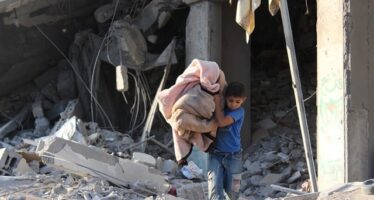Haiti cholera protester shot dead by UN peacekeepers
![]()
At least one man has been shot dead in clashes with UN peacekeepers in Haiti, amid a continuing cholera epidemic that has killed more than 900 people.

UN troops fired tear gas to disperse demonstrators throwing stones and blocking roads in Cap Haitien. Some Haitians have accused peacekeepers from Nepal of introducing cholera to Haiti for the first time in a century.The UN says it has found no evidence to justify the accusation, but the cholera strain matches a South Asian one. The Nepalese army said tests had proved that the allegation regarding its personnel was false. A demonstrator was shot and killed by a United Nations peacekeeper during an exchange of gunfire in Quartier Morin, on the outskirts of Haiti’s second largest city, Cap Haitien, the UN mission said.
“There was a demonstrator who had a weapon and fired at a soldier, and the soldier returned fire in legitimate self-defence,” said Minustah (UN mission in Haiti) spokesman Vicenzo Pugliese.
United Nations Stabilization Mission in Haiti (Minustah)
-
The mission consists of 11,848 military and police personnel from 57 countries
- Its original mandate to restore and secure stability was extended after January’s earthquake to support reconstruction and recovery
- Almost 100 peacekeepers were killed by the earthquake – the biggest single loss of life in UN peacekeeping history
- The cost of the mission for the six months to the end of December 2010 is $380m (£237m)
Source: Minustah
Hundreds of protesters threw stones at UN peacekeepers, set up burning barricades and torched a police station in Cap Haitien.
Six UN peacekeepers were injured in the clashes, the UN said. At least 10 people were also injured.
As well as calling for UN peacekeepers to leave Haiti, demonstrators accused the government of “leaving the people to die”, the AFP news agency reported.
Protesters also clashed with UN troops from Nepal in the central town of Hinche.
‘National security’
There have also been protests against the location of cholera treatment centres, which some people fear will bring the disease into their neighbourhoods.
The UN humanitarian co-ordinator for Haiti, Nigel Fisher, said the demonstrations showed the cholera outbreak had gone beyond a health crisis to become “an issue of national security”.
He added that UN agencies expected a significant increase in the number of cholera cases after a nationwide review.
“It is spreading and we have to try to contain the number of cases and we have to try to contain the number of deaths,” Mr Fisher said.
A spokesman for the Nepalese army told the BBC that three tests carried out on its service personnel had shown they were not the source of the cholera outbreak.
“When this false allegation came up, the UN mission headquarters ordered the tests on our peacekeepers. None of them were found to have cholera symptoms or bacteria.
“All of them are free of cholera. The allegation initially thrown on the Nepalese contingent was proven false.”
Cholera is now present in all 10 of Haiti’s provinces.
Aid agencies are battling to contain the disease in the capital Port-au-Prince, amid fears it will spread through camps housing 1.1 million earthquake survivors.
President Rene Preval addressed the nation on Sunday to implore people to use good hygiene to prevent infection.
But many Haitians lack access to clean water, soap and proper sanitation.
The UN has appealed for $164m (£101m) to tackle the epidemic over the next year.
The UN expects the cholera outbreak will get much worse
The worst affected area remains the central province of Artibonite, where at least 595 people have died.
In Port-au-Prince – which was badly damaged by the earthquake in January – 27 deaths have been recorded, most of them in the slum district of Cite Soleil.
Earlier this month, Hurricane Tomas brought heavy rains, which aid agencies say contributed to the spread of the disease, as rivers burst their banks.
Up to 200,000 Haitians could contract cholera, the United Nations says.
Cholera itself causes diarrhoea and vomiting, leading to severe dehydration. It can kill quickly, but is treated easily through rehydration and antibiotics.
Presidential and parliamentary elections are due to take place in two weeks, on 28 November.
Related Articles
Gaza/Israel: Colombia presenta solicitud de intervención en demanda de Sudáfrica contra Israel
![]()
Este 5 de abril la Corte Internacional de Justicia (CIJ) ha informado que Colombia ha presentado una solicitud de intervención en la demanda interpuesta por Sudáfrica contra Israel por el drama indecible que se vive en Gaza desde la tarde/noche del 7 de octubre
UK violates rights of terror suspects with ‘unfair’ control orders
![]()
Amnesty International has accused the UK government of developing a “shadow justice system” that imposes severe restrictions on the rights
Pakistan Pushes Draconian New Terror Bill
![]()
Secret Trials, Unchallengeable Summary Detentions on the Table Pakistani Interior Minister Rehman Malik today proposed a



